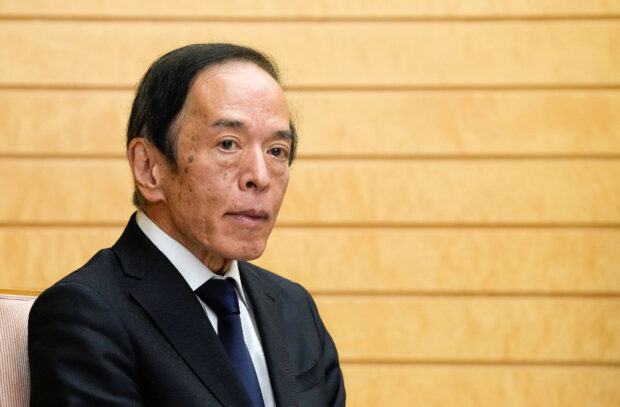
New Governor of Bank of Japan Kazuo Ueda waits for Japanese Prime Minister Fumio Kishida before their meeting at prime minister?s official residence in Tokyo, Japan, April 10, 2023. Kimimasa Mayama/Pool via REUTERS
TOKYO -Japan’s new central bank governor Kazuo Ueda will see his communication skills put to test at his debut policy meeting on Friday, as markets look for clues on how soon the country’s prolonged ultra-low interest rates could end.
At the meeting Ueda chairs just three weeks into his term, the Bank of Japan (BOJ) is widely expected to maintain its short-term interest rate target of -0.1 percent and a pledge to guide the 10-year bond yield around zero.
The central bank is also seen maintaining dovish guidance that pledges to keep interest rates at “current or lower levels” to ensure Japan sustainably hits its 2 percent inflation target accompanied by solid wage growth, analysts say.
https://business.inquirer.net/397511/bojs-ueda-vows-to-keep-rates-low-for-now-signals-chance-of-future-hike
But growing signs of broadening inflationary pressure could cast doubt on the BOJ’s argument the recent cost-driven price pressures will soon peter out.
Core consumer inflation in Japan’s capital hit 3.5 percent in April, beating expectations and exceeding the BOJ’s 2 percenttarget, while an index stripping away fuel costs rose at the fastest pace in four decades, data showed on Friday.
At his post-meeting news conference, Ueda is likely to reiterate the need to keep monetary policy ultra-loose until there is more evidence that sustained wage growth will push trend inflation towards the BOJ’s 2 percent target.
Global recession fears also cloud the outlook for Japan’s export-reliant economy, giving the BOJ another reason to go slow in phasing out its massive stimulus, analysts say.
“The BOJ is concerned about a slowdown in the economy, and believes maintaining ultra-loose monetary policy is necessary to encourage economic activity,” said Katsutoshi Inadome, senior strategist at SuMi Trust.
https://business.inquirer.net/397324/japan-opens-new-chapter-maybe-era
Much is riding on how the BOJ manages an eventual transition away from the loose policy of former Governor Haruhiko Kuroda, with global investors worried higher Japanese interest rates could trigger capital flight and reshape financial markets in ways they are not prepared for.
Key to an orderly transition will be Ueda’s ability to clearly communicate his policy intentions without upending markets.
With inflation exceeding 3 percent and the cost of living remaining stubbornly high, Ueda may struggle to convince markets that a tweak to yield curve control (YCC) is not imminent.
The BOJ’s forceful defense of an implicit 0.5 percent cap set for the 10-year bond yield has drawn criticism for distorting the shape of the yield curve and draining bond market liquidity, heightening expectations that Ueda will soon phase out YCC.
The International Monetary Fund has urged the BOJ to allow long-term yields to move more flexibly around its target with a tweak to YCC, to make a future exit from easy policy smoother.
https://business.inquirer.net/367777/imf-sees-japans-currency-intervention-as-signaling-move-with-short-term-impact
Despite Ueda’s reassurances to keep YCC intact, some market players are bracing for another surprise move having been caught off guard by his predecessor’s abrupt decision in December to raise the yield cap to 0.5 percent from 0.25 percent.
Aside from Ueda’s comments, hints on the policy outlook could come from the BOJ’s fresh quarterly growth and inflation forecasts due out on Friday, which will include for the first time projections extending through fiscal 2025.
The new estimates will indicate how the BOJ sees the balance between headwinds from slowing overseas growth, and recent signs of broadening wage growth, analysts say.
Under current projections made in January, the BOJ expects core consumer inflation to hit 1.6 percent this year and 1.8 percent in fiscal 2024. It expects the economy to expand 1.7 percent this fiscal year before slowing to 1.1 percent the following year.
Many analysts expect the BOJ to project inflation to hover near, but stay slightly below, the bank’s 2 percent target for both fiscal 2024 and 2025.